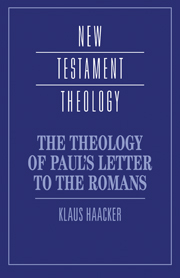Book contents
- Frontmatter
- Contents
- List of abbreviations
- 1 Introduction
- 2 Theology in a nutshell: The opening of the letter as a foretaste of what follows
- 3 Theology in process: An outline of the argument of the letter-body
- 4 Major concerns
- 5 Sorting the sources
- 6 To the Romans a Roman? The rhetoric of Romans as a model for preaching the Gospel in Rome
- 7 Romans in its canonical context
- 8 The impact of Romans and interactions with Romans in Church history
- 9 The relevance of Romans reconsidered
- Further reading
- Index of authors
- References
- Index of subjects
9 - The relevance of Romans reconsidered
Published online by Cambridge University Press: 05 June 2012
- Frontmatter
- Contents
- List of abbreviations
- 1 Introduction
- 2 Theology in a nutshell: The opening of the letter as a foretaste of what follows
- 3 Theology in process: An outline of the argument of the letter-body
- 4 Major concerns
- 5 Sorting the sources
- 6 To the Romans a Roman? The rhetoric of Romans as a model for preaching the Gospel in Rome
- 7 Romans in its canonical context
- 8 The impact of Romans and interactions with Romans in Church history
- 9 The relevance of Romans reconsidered
- Further reading
- Index of authors
- References
- Index of subjects
Summary
In this concluding chapter I am going to point out aspects of the theology of Romans which I regard as important contributions to present-day developments in theology, or as promising answers to challenges felt to be urgent in our time. Perhaps I should apologise for straining the term ‘present-day’ too much when I include developments that emerged thirty or forty years ago. It is not only because I hesitate to treat my own lifetime as a chapter of past history, but also because I have the impression (and hope) that these developments will keep going and continue to bear fruits in the near future.
ROMANS AND THE RECONCILIATION BETWEEN CHRISTIANS AND JEWS
In the years after the Second World War the horrors of the holocaust were recognised as a challenge to traditional Christian theology. It was conceded that the organised crimes against the Jewish people were the product of a racism that was hostile not only to the Jews but also to most of the genuinely Christian traditions. Nevertheless, it had to be admitted that a traditional anti-Judaism among Church members had paved the way for Hitler's rise to power, and had produced a fatal indifference towards the increasing sufferings of Jews in Germany and in other European countries which were occupied by Germans during the war. The conclusion was inevitable that traditional Christian education and the theological teaching behind it had to be taken to task for this failure.
- Type
- Chapter
- Information
- The Theology of Paul's Letter to the Romans , pp. 162 - 171Publisher: Cambridge University PressPrint publication year: 2003



